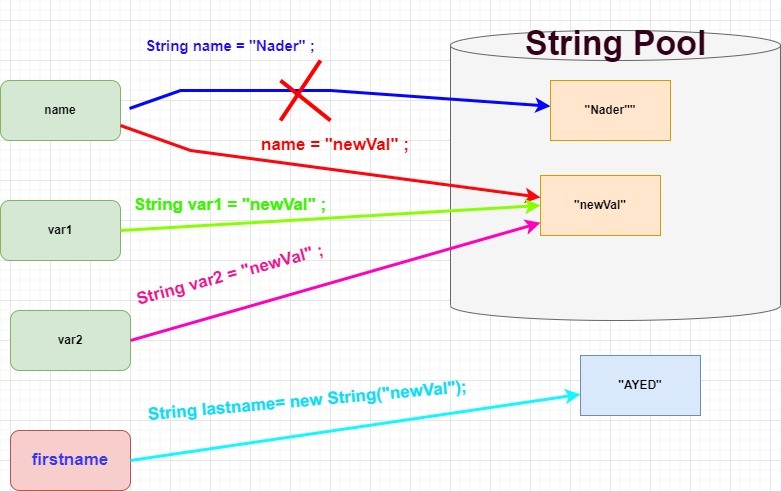Why Are Strings Immutable in Java? Comprehensive Guide for Beginners
Wiki Article
Checking Out the Advantages of Unalterable Strings in Modern Programs Paradigms
In the world of modern shows paradigms, the concept of unalterable strings stands as a foundation of durable software growth. The advantages they offer exceed plain convenience; they essentially modify the means data is dealt with within applications. By adopting unalterable strings, programmers can guarantee boosted data integrity, improved string safety and security, streamlined debugging procedures, increased safety and security steps, and efficient performance optimization. These advantages work as a testimony to the profound influence that embracing immutability can carry the reliability and efficiency of software application systems.Improved Data Honesty

By preventing the alteration of string objects, immutability gets rid of the risk of unintended changes to the data they hold. This not just improves the safety of the details however additionally improves the integrity of the code that relies upon these strings.
Immutability additionally sustains much safer multithreading environments, as simultaneous access to unalterable strings does not posture the danger of information corruption through synchronised modifications. This building simplifies the procedure of handling strings in parallel programs situations.
Basically, immutability works as a protective guard around the data kept within strings, improving their integrity by making sure that as soon as specified, their worths remain unchanged throughout the program's implementation.

Boosted String Safety And Security
Immutable strings boost the thread security of programs by guaranteeing that once a string item is created, its value can not be customized. This building eliminates the risk of simultaneous threads trying to modify the very same string concurrently, which might bring about information corruption or inconsistent states in the program - Why are strings immutable in Java?. In a multi-threaded atmosphere, where several threads access and control information all at once, the immutability of strings provides a level of safety by guaranteeing that the data remains the same throughout its lifecycleStreamlined Debugging Procedures
Offered the improved thread safety facilitated by unalterable strings, a significant advantage emerges in the world of simplified debugging procedures. Immutable strings, as soon as produced, can not be altered, making it simpler to trace the circulation of data and determine the source of bugs in a program. This immutability makes sure that strings continue to be consistent throughout the execution of the program, decreasing the probability of unexpected adjustments that could result in errors.When debugging with mutable strings, designers frequently encounter problems where a string's worth is customized unintentionally, making it challenging to determine the source of a bug. Nonetheless, with unalterable strings, the information stays the same, permitting developers to concentrate on analyzing the real reasoning of the code instead of finding where and when a string was changed improperly.
Additionally, immutable strings simplify the debugging procedure by allowing simpler recreation of bugs. Since immutable strings do not alter state, designers can recreate and examine pests extra properly, resulting in quicker identification and resolution of problems within the codebase. This structured debugging operations inevitably adds to higher software program quality and improved general growth effectiveness.

Boosted Security Steps
Enhancing information security and fortifying system honesty, the usage of unalterable strings in software applications contributes considerably to raised safety and security actions. Unalterable strings also play a vital role in stopping common safety susceptabilities such as barrier overflows and SQL injection assaults, as attempts to control string data at runtime are inherently restricted.Additionally, the immutability of strings boosts the predictability of program actions, making it much easier to confirm inputs and avoid unexpected changes that could compromise safety and security. This predictability simplifies the process of auditing and verifying code, making it possible for programmers to recognize potential protection technicalities much more properly. In general, including immutable strings into software program advancement techniques not just boosts the robustness and reliability of applications yet also strengthens their resilience versus safety hazards.
Efficient Efficiency Optimization
Structure upon the foundation of raised security measures achieved via the utilization of immutable strings, a crucial facet to take into consideration in software program growth is efficient efficiency optimization. When managing mutable strings, procedures like concatenation or substring development commonly lead to the production of new string things, leading to memory overhead and increased processing time. However, with unalterable strings, these procedures can be optimized to improve efficiency. By enabling strings to continue to be continuous and unchangeable, immutable strings help with much better memory administration and caching chances, eventually increasing the overall performance of the software application.
Considering that immutable strings can not be changed when produced, they can be shared throughout strings without the danger of unforeseen adjustments, reducing the need for synchronization devices and enhancing concurrency. Immutable strings simplify debugging processes as designers can rely on that a string's worth will remain constant throughout the program's implementation, removing possible mistakes caused by mutable state changes.
Final Thought
In verdict, the advantages of utilizing unalterable strings in modern programs standards can not be overstated. Improved information honesty, enhanced string safety and security, streamlined debugging procedures, raised protection next page actions, and reliable efficiency optimization all add to the general efficiency of programming tasks. By incorporating unalterable strings into shows methods, designers can benefit from an extra robust and trusted codebase.Immutability, a key attribute of strings in programs languages such as Java and use this link Python, guarantees that once a string object is created, it can not be changed or modified.Unalterable strings boost the thread safety of programs by making certain that when a string object is developed, its worth can not be modified. Unalterable strings likewise play a crucial duty in stopping usual safety vulnerabilities such as barrier overflows and SQL injection attacks, as efforts to control string data at runtime are naturally restricted.
By allowing strings to stay continuous and unchangeable, unalterable strings promote far better memory monitoring and caching possibilities, inevitably improving the general effectiveness of the check it out software application.
Immutable strings simplify debugging procedures as designers can rely on that a string's value will certainly stay consistent throughout the program's implementation, removing possible errors triggered by mutable state changes.
Report this wiki page